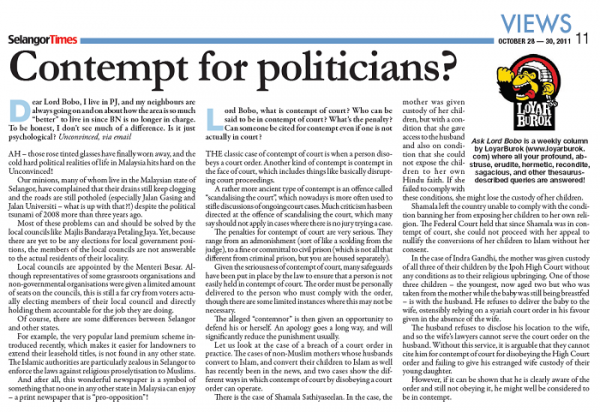 From the Selangor Times Issue 46, 28-30 Oct 2011. Ask Lord Bobo is a weekly column by LoyarBurok where all your profound, abstruse, erudite, hermetic, recondite, sagacious, and other thesaurus-described queries are answered!
From the Selangor Times Issue 46, 28-30 Oct 2011. Ask Lord Bobo is a weekly column by LoyarBurok where all your profound, abstruse, erudite, hermetic, recondite, sagacious, and other thesaurus-described queries are answered!
Dear Lord Bobo, I live in PJ, and my neighbours are always going on and on about how the area is so much “better” to live in since BN is no longer in charge. To be honest, I don’t see much of a difference. Is it just psychological? (Unconvinced, via email)
Ah – those rose tinted glasses have finally worn away, and the cold hard political realities of life in Malaysia hits hard on Unconvinced!
Our minions, many of whom live in the Malaysian state of Selangor, have complained that their drains still keep clogging and the roads are still potholed (especially Jalan Gasing and Jalan Universiti – what is up with that!) despite the political tsunami of 2008, more than 3 years ago.

Most of these problems can and should be solved by the local councils like the Majlis Bandaraya Petaling Jaya. Yet, because Pakatan Rakyat just like Barisan Nasional do not seem to support elections for local government positions, the members of the local councils are not answerable to the actual residents of their locality.
Local councils are appointed by the Menteri Besar. Although representatives of some grassroots organisations and non governmental organisations were given a limited amount of seats on the councils, this is still a far cry from voters actually electing members of their local council and directly holding them accountable for the job they are doing.
Of course, there are some differences between Selangor and other States. For example, the very popular land premium scheme introduced recently, which makes it easier for landowners to extend their leasehold titles, is not found in any other State. The Islamic authorities are particularly zealous in Selangor to enforce the laws against religious proselytization to Muslims. And after all, this wonderful newspaper is a symbol of something that no one in any other State in Malaysia can enjoy – a print newspaper that is “pro Opposition”!

Lord Bobo, what is contempt of court? Who can be said to be in contempt of court? What’s the penalty? Can someone be cited for contempt even if one is not actually in court?”
The classic case of contempt of court is when a person disobeys a Court Order. Another kind of contempt is contempt in the face of court, which includes things like basically disrupting Court proceedings. A rather more ancient type of contempt is an offence called “scandalizing the Court” which nowadays is more often used to stifle discussion an ongoing Court case. Much criticism has been directed at the offence of scandalizing the Court, which many say should not apply in cases where there is no jury trying a case.
The penalties for contempt of court are very serious. They range from an admonishment (sort of like a scolding from the Judge), to a fine or committal to civil prison (which is not all that different from criminal prison, but you are housed separately).
Given the seriousness of contempt of court, many safeguards have been put in place by the law to ensure that a person is not easily held in contempt of court. The order must be personally delivered to the person who must comply with the order, though there are some limited instances where this may not be necessary. The alleged “contemnor” is then given an opportunity to defend his or herself. An apology goes a long way, and will significantly reduce the punishment usually.
Let us look at the case of a breach of a Court order in practice. The cases of non Muslim mothers whose husbands convert to Islam, and convert their children to Islam as well has recently been in the news and two cases show the different ways in which contempt of court by disobeying a Court order can operate.
There is the case of Shamala. In that case, the mother was given custody of her children but with a condition that she give access to the husband and also on condition that she could not expose the children to her own Hindu faith. If she failed to comply with these conditions, she might lose the custody of her children. Shamala left the country unable to comply with the condition banning her from exposing her children to her own religion. The Federal Court held that since Shamala was in contempt of court, she could not proceed with her appeal to nullify the conversions of her children to Islam without her consent.
In the case of Indra Gandhi, the mother was given custody of all three of their children by the Ipoh High Court without any conditions as to their religious upbringing. One of those three children – the youngest, now aged 2 but who was taken from the mother whilst the baby was still being breastfed – is with the husband. He refuses to deliver the baby to the wife, ostensibly relying on a syariah court order in his favour given in the absence of the wife. The husband refuses to disclose his location to the wife, and so the wife’s lawyers cannot serve the Court order on the husband. Without this service, it is arguable that they cannot cite him for contempt of court for disobeying the High Court order and failing to give his estranged wife custody of their young daughter. However, if it can be shown that he is clearly aware of the Order and still not obeying it, he might well be considered as in contempt.
Have a question for Lord Bobo? Call on His Supreme Eminenceness by emailing[email protected], stating your full name, and a pseudonym (if you want), or tweeting your questions by mentioning @LoyarBurok and using the hashtag #asklordbobo. What the hell are you waiting for? Hear This, and Tremblingly Obey (although trembling is optional if you are somewhere very warm)! Liberavi Animam Meam! I Have Freed My Spirit!
You can read archives of all the Ask Lord Bobo columns by clicking here. These are the divinely-inspired words of His Supreme Eminenceness Lord Bobo Barnabus PhD SP GBE OMGWTFBBQ.
